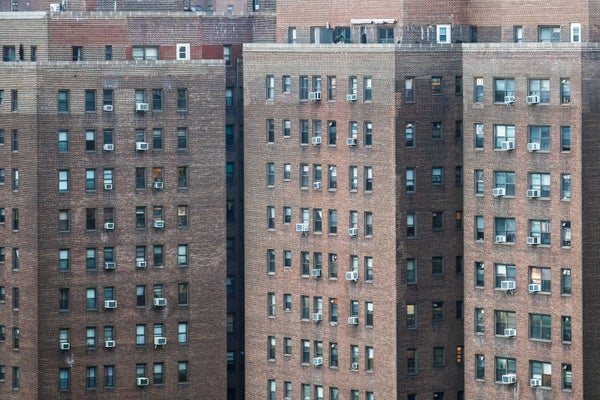Trump Targets Air-Conditioning and Heating Funds for Low-Income Households
The Trump administration’s proposed budget cuts the Low Income Home Energy Assistance Program (LIHEAP), which provides funding for home heating and cooling

A close-up view of red-brick residential apartment buildings in New York City, showcasing repetitive windows, air conditioning units.
Karolis Kavolelis/Alamy Stock Photo
CLIMATEWIRE | The Trump administration proposed eliminating a program that helps low-income families heat and cool their homes, saying “energy dominance” policies make subsidizing electricity costs unnecessary.
The Low-Income Home Energy Assistance Program provides support to some 6 million Americans and has bipartisan support in Congress, particularly among Republicans such as Maine Sen. Susan Collins, whose constituents depend on the funds to heat their homes in the winter.
As climate change has turbocharged heat waves across the country, LIHEAP has been increasingly relied on to fund air conditioning costs. Lawmakers from hotter states have pushed for increased funding to help low-income Americans remain safe in the summer.
On supporting science journalism
If you’re enjoying this article, consider supporting our award-winning journalism by subscribing. By purchasing a subscription you are helping to ensure the future of impactful stories about the discoveries and ideas shaping our world today.
The vast majority of Americans who are killed by heat die indoors, often in homes without air conditioning.
“LIHEAP is critical for helping folks adapt to extreme heat,” said Mark Wolfe, head of the National Energy Assistance Directors Association.
But the Trump administration argued in its proposed fiscal 2026 budget, released Friday, that it’s unnecessary to subsidize heating and cooling costs.
“The budget proposes to end this program and to instead support low-income individuals through energy dominance, lower prices and an American First economic platform,” the budget document said.
The administration also takes issue with the amount of LIHEAP funding that goes to New York and California, two of the most populous states in the country that the White House described as having “implemented anti-consumer politics that drive up home energy prices.”
It called LIHEAP “unnecessary,” saying many states have programs preventing utilities from shutting off heat during the winter.
Wolfe questioned that logic, noting that customers who benefit from shutoff protections would still have to pay for heating and electricity costs they may not be able to afford.
“Even if the president is successful in lowering energy costs, that change is not going to be felt this year when people have electric bills to pay,” he said. “And families’ budgets are only going to be tighter because of tariffs — how will they cope?”
LIHEAP has been funded through the end of summer, though the Trump administration has placed the program’s entire staff on administrative leave as part of an expansive reorganization at the Department of Health and Human Services. The program’s staff is set to be fired on June 2.
Trump’s proposal to eliminate funding would start to hit families this fall — if Congress agrees. Collins, who chairs the Senate Appropriations Committee, has been a staunch supporter of LIHEAP for years.
She and others on the committee sent a letter in early April to HHS urging the administration to “reverse course on any staffing or funding cuts,” which it said “threaten to devastate a critical program dedicated to helping Americans afford their home energy bills.”
“Access to affordable home energy is a matter of health and safety for many low-income households, children and seniors,” the letter said.
Reprinted from E&E News with permission from POLITICO, LLC. Copyright 2025. E&E News provides essential news for energy and environment professionals.





